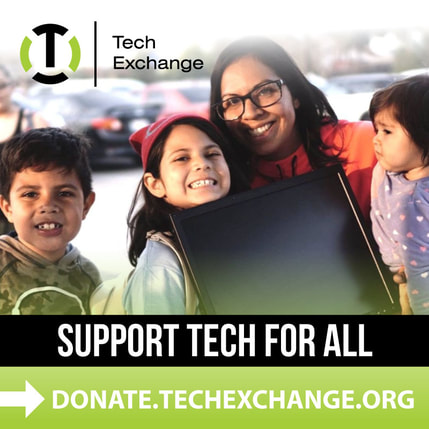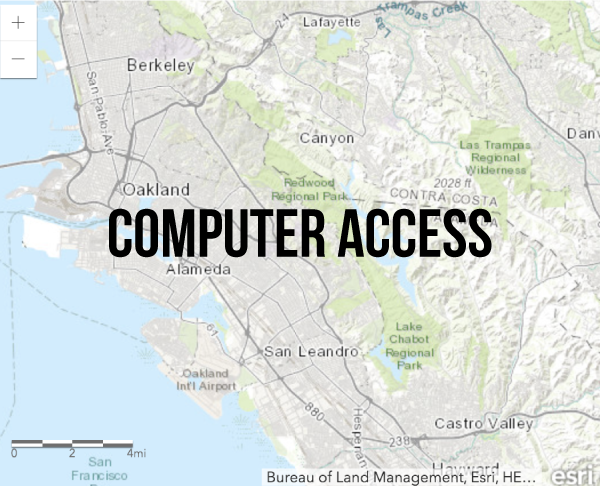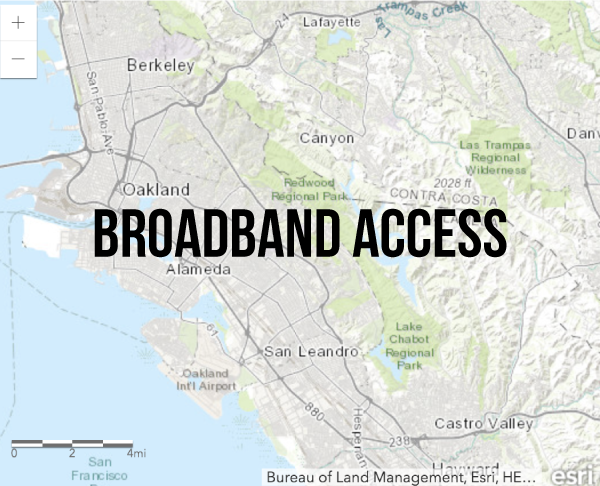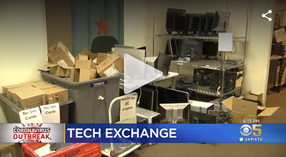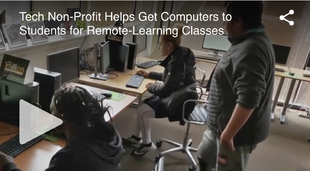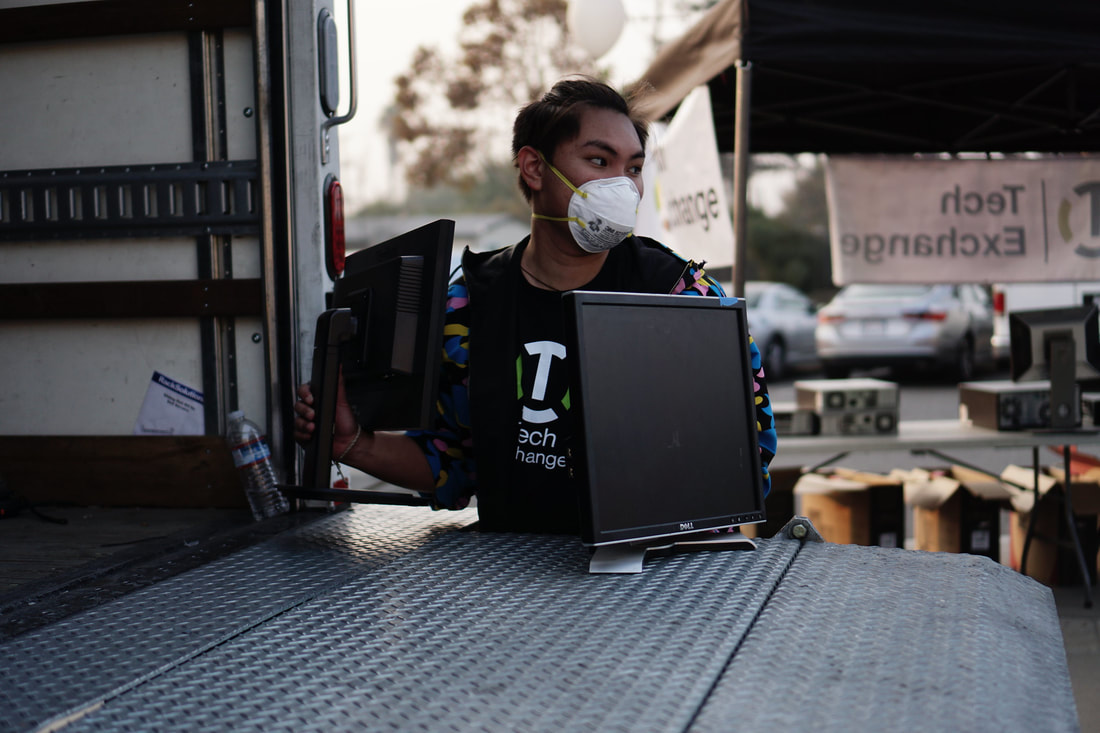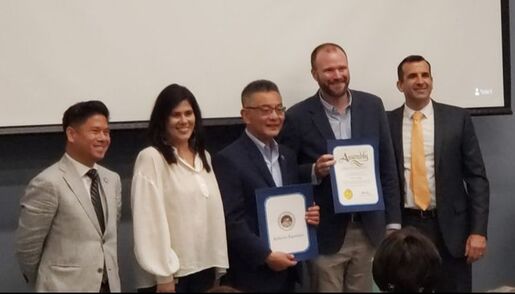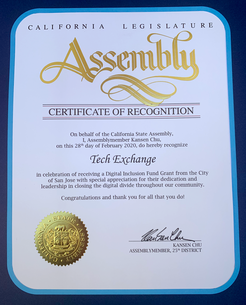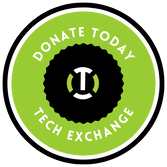|
For many of us, day-to-day life has changed significantly over the last few weeks. Schools throughout the Bay Area have closed indefinitely, and all non-essential businesses have transitioned to work remotely--or, in some cases, closed altogether. For those with access to technology, adjusting to this "new normal" might include scheduling video meetings with co-workers, relying on email for class assignments, or hosting "get togethers" via social media. For those without Internet access, the digital divide has never been wider. Today in the Bay Area, 1.5 million residents do not have access to a computer at home. 94,000 Oakland residents are without devices or Internet access – including 17,000 students. Click below for interactive maps that identify digitally disconnected households across the Bay Area. Since the Shelter-in-Place order was announced here in the Bay Area, Tech Exchange staff and volunteers have mobilized to establish texting and phone banks. They are responding to calls to inform families of internet options, and preparing hotspots and laptops to be distributed to students. To continue this critical work, we are announcing our TECH FOR ALL Campaign to raise $650,000.
Your donation today helps to ensure that all students and families can stay connected
and access online learning opportunities during this time of isolation and beyond. Click HERE to donate today. Thank you!
4 Comments
KPIX 5 NEWS, March 20, 2020
Tech Exchange helps families in need get computers, Internet access and computer skills so students can continue their education as schools go virtual to cope with coronavirus. Don Ford reports.
As the world comes together in isolation, we know closing the digital divide is as important as ever.
Please consider donating to Tech Exchange today so that we can continue to lead the critical work in ensuring all communities are connected.
By Don Ford
OAKLAND (KPIX 5) — With the coronavirus forcing many California school districts to emphasize online learning, some students are facing a major challenge: they still don’t have computers. The nonprofit company Tech Exchange is helping families in need get computers, internet access and computers skills so students can continue their education for free. “Beyond what the immediate need is here in Oakland, between Alameda County, Contra Costa County and Santa Clara County, we’re in need of 4,000 to 5,000 devices,” said Tech Exchange Director of Sales and Support Joel Peña. Tech Exchange get all manner of high-quality decommissioned computers, tablets and desktops from companies upgrading to new devices. The devices are then re-imaged and certify that all data has been erased. Some recently arrived brand new units from Sprint are going to Oakland High students. “These are the first batch of 300 that are going to 12 sites at the grab and go lunch that are set up here by OUSD,” said Peña. Dwayne Butler’s son got his tablet early. “His grades ain’t the best of grades, but this will help him to get ’em up. So, you know, it was a great opportunity for us to come down and be able to get one,” said Butler. Tech Exchange has actually been around for 20 years. They say in the last 4 years alone, they have refurbished and delivered 10,000 devices to high school student all across the Bay Area. Now more than ever, the need is great. The only catch is the devices must be returned by the students when they graduate. OAKLAND, California – As an immediate response to school closures across the Bay Area, nonprofit Tech Exchange mobilized to extend hours and prepare for distribution and tech support to families without digital access. At their community Tech Hub on International Boulevard in Oakland, CA, Tech Exchange staff and volunteers welcomed a constant flow of families and provided them with computers, mobile devices, and home Internet services. Approximately 100 devices were handed out from the time schools closed on Friday, March 13 through Monday, March 16th, 2020 when the Shelter in Place order was announced. Currently, Tech Exchange has configured their phone system to serve as a call center. They are fielding inquiries and supporting community members by providing options for affordable Internet and devices by phone. Additionally, they continue to work with several local school districts, supporting students with internet and device access. Executive Director Seth Hubbert shared the following statement today: “We've been in coordination with several school districts on supporting their students with internet and device access. We have a team organizing devices at the Tech Hub to prepare them for distribution. We will then transfer them to school district personnel to distribute to families. In Oakland, we have aligned efforts with the "Grab and Go" program that is distributing food at 12 school locations. To support students without home technology access, we will be distributing 1 Million Project devices that come with free data and hotspot functionality. We are preparing approximately 200 devices that will go out today.” ABOUT TECH EXCHANGE Tech Exchange is driven to provide digital equity throughout the Bay Area by equipping underserved community members with affordable Internet connection, digital literacy skills, and refurbished computers coupled with free tech support. These digital inclusion services empower all individuals with the fundamental ability to access online education, employment, health care, financial services, and public resources as means with which to improve and enhance their lives. Over the last 25 years, Tech Exchange has distributed over 50,000 refurbished computers to underserved Bay Area community members, provided over 10,000 instructional hours of training, and offered 200 youth technical internships, all while diverting over 1,000 tons of e-waste from landfills. Currently, Tech Exchange serves over 4,000 households a year with digital inclusion services, with programming active in Alameda, Contra Costa, San Francisco, and Santa Clara counties. www.techexchange.org As the world comes together in isolation, we know closing the digital divide is as important as ever.
Please consider donating to Tech Exchange today so that we can continue to lead the critical work in ensuring all communities are connected. Despite being the largest city in Silicon Valley, San José has a persistent digital divide that excludes many residents from the opportunities offered by technologies that are developed in its own backyard. A city-sponsored survey found that 95,000 San José residents (50,000 households) lack access to broadband. Statewide; the number of unconnected residents is five million. A grant from the San Jose City Council aims to bridge the divide by connecting 50,000 San José low-income households to the Internet in the next 10 years. San José is using fees collected from companies rolling out 5G and leveraging them with privately-raised funds. The program expects to distribute up to $24 million in grants over the next decade to local nonprofits, public agencies and educational institutions. The selected organizations are positioned to offer universal device access and affordable universal connectivity, ensuring currently disconnected households achieve and sustain the appropriate digital skills proficiency level to stay ahead of technology and increase quality of life outcomes. The city has designed the Partnership to be a collaborative, outcomes-driven effort by a wide range of community institutions, nonprofits, corporations and civic leaders. CETF, a statewide nonprofit established in 2005 by the California Public Utilities Commission to close the digital divide by accelerating the deployment of broadband, has been appointed by the San José City Council to manage the grants from the Digital Inclusion Fund. The San José City Council announced recipients of the grant, including Tech Exchange among the 23 organizations: 2020 DIGITAL INCLUSION FUND GRANT RECIPIENTS
“Digital access is still a barrier for far too many Bay Area residents,” says Seth Hubbert, Executive Director of Tech Exchange. “Approximately 1.5 million Bay Area residents lack access to broadband and a home computer. The Digital Inclusion Fund helps to leverage our collective commitment to building stronger and more inclusive communities.”
|
Categories
All
Archives
July 2024
|

